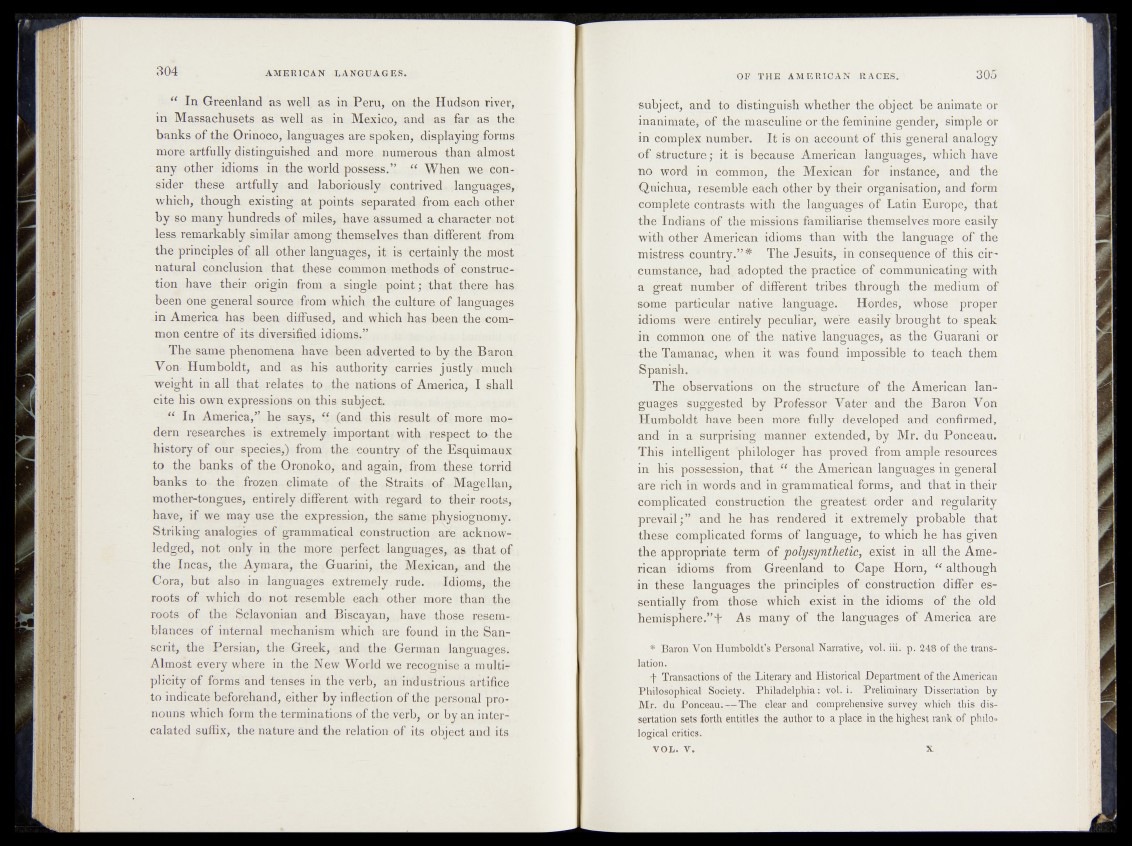
“ In Greenland as well as in Peru, on the Hudson river,
in Massachusets as well as in Mexico, and as far as the
banks of the Orinoco, languages are spoken, displaying forms
more artfully distinguished and more numerous than almost
any other idioms in the world possess.” “ When we^ffe;
sider these- artfully and laboriously contrived- languages.,
which, though existing at points separated from each-other
by so many hundreds of miles, have assumed a character not
less remarkably similar among themselves than different from
the principles of all other languages,- it is certainly the most
natural conclusion that these common methods of construction
have their origin from a single point; that there -has
been one general source from which the culture of languages
in America has been diffused, and which has been the common
centre of its diversified idioms.”
The same phenomena have been adverted to by the Baron
Von- Humboldt, and as his authority carries justly-much
weight in all that-relates , to the nations of America, I shall
cite his own expressions on this subject
' “ In America,” he says, “ (and this result, of. more -modern
researches is extremely important with ; respect to the
history of our species,) from the country of the Esquimaux
to the banks of the Oronoko, and again, from these'; torrid
banks to the frozen climate of the S tra itso f Magellan*
mother-tongnes, entirely different with regard to their roots,,
have, if we may use the expression, the same physiognomy.
Striking analogies of grammatical construction are' acknowledged,
not only in the more perfect languages,, as that. %
the Incas, the Aymara, the Guarini, the Mexican, and the
Cora, but also in languages extremely, rude. Idioms, the
roots of which do not resemble each other more than the
roots of the Sclavonian and Biscayan, have those resemblances
of internal mechanism which are found in the Sanscrit,
the Persian, the Greek, nnd the German languages.
Almost everywhere in the: New World we recognise a multiplicity
of fdrms and tenses in the verb, an ihdustriouS artifice
to indicate beforehand,,either by inflection of the personal pronouns
which form the terminations of the verb, or by an intercalated
suffix, the nature and the relation of its object and its
'Subject, and to distinguish whether the object be animate or
inanimate,! of the masculines or the ferfiÉnrnë gender," simple or
in complex number. It is ,on aceo.unt of this^general analogy
of structure; it is Wcapse American languages, which have
no word in common, the Mexican for- instance, and the
Quichua, resemble eèeh*'other by their organisation'and form
complete contrasts.with the la^^agesföf Latin Europe, that
the Indians of the missions familiarise1 themselvèd’more'‘easily
yv^ib bther American idioms? than with thé language of the
mistress country.” * The Jesuits, in consequence of this 'circumstance,
had, adopted the pratrticé of communicating with
a great number of different tribes- through . the medium of
some particular native language.*!« Hordes,.' whose ^pröper
idioms ^ere^ entirely peculiar, were- easily brought'to spe'ak
in commonjone of the native languages,, as^the Guarani, or
the Tamanap, when it was found impossible to?teach them
Spanish. ,
The observations on the structure of the American languages
suggested by Professor Vatet and the Baron Von
Humboldt have been iffore fully developed and confirmed,
and in a surprising; manner extended, by Mr. dul Ponceau. .
This- intelligent* philologer has proved from ample resources
in his possession, that “ the; American languages ifftjppferal
are rich tn words and iff grammatical-forms, and that in their
complicated construction the greatest order and regularity
prevail;” and he has rendered it extremely'probable that
these complicated forms of language, to which hé has given
the appropriate term of polysynthetic, exist in all the American
idioms from Greenland'to Cape Horn, “ although
in these languages the principles • of 'cbristrubtion differ essentially
from those which exist iff the idioms of thé old
hemisphere.”t As many of the languages of America are
* Baron Von Humboldt’s Personal Narrative, yuhiimp. 248 of the translation.
f Transactions of the Literary and Historica] Department oi^the American,.
Philosophical Society. Philadelphia; vol. i. Preliminary Dissertation by
Mr. du Ponceau; -— The clear and comprehensive survey, which this dissertation
sets forth entitles the author to a place in, the highest rank of philological
critics.